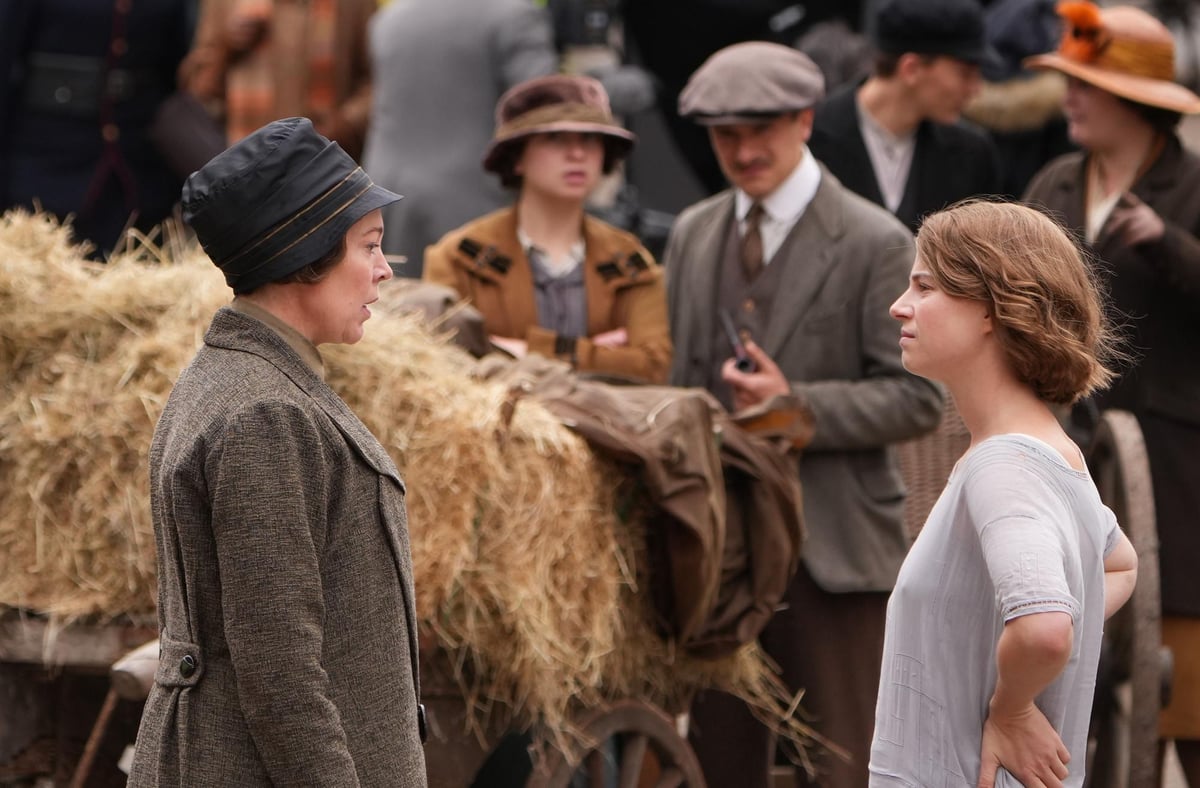I had Wicked Little Letters pegged as the grandma movie of the year. I mean, come on: British people up in arms about someone writing dirty letters? That’s brill in a barrell. But throw in a bit of provocative, um, coloring in the language, and I’d amend my previous statement and say this is the perfect grandma/teenage granddaughter movie, like in my theater where a teenager was explaining the jokes in PG language to her delighted but confused nana. Plus, when it’s Olivia Colman and Jessie Buckley cursing at you, the verbal bitters go down a little sweeter.
Loosely based on a story that happened in Littlehampton, England in the 1920s, no one knows who’s writing these wicked little letters, going to random townfolk, but especially Edith Swan (Olivia Colman). The chief constable Spedding (Paul Chahidi) and constable Pepperwick (Hugh Skinner), as well as Edith’s parents Edward (Timothy Spall) and Victoria (Gemma Jones) think this is an open and shut case. Swan has become estranged from her, boozing, fornicating, foul mouthed Irish neighbor Rose Gooding (Jessie Buckley), quite clearly matching the wicked in the letters to Edith. Rose is arrested, but Female Police Officer Gladys Moss (Anjana Vasan) isn’t convinced, as pieces of the story don’t quite fit, putting her at war with her superiors and her conscience as to what to do.
The filmmakers make a clear choice on who to side with. We’re on Rose Gooding’s wavelength watching Wicked Little Letters. This movie wears its period setting to essentially remove any subtlety about British feelings towards women and society, laying all its cards on the table. I mean when you cast Timothy Spall, you know there’s going to be some evil side eye barely withholding even more evil thoughts. I’m legitimately surprised he wasn’t named Mr. Sogynist, with all the vile garbage he spews. All the white men are in power, using that power against Rose, or Edith, or Female Police Officer Moss, which they keep insisting on calling her. While clearly trying to make a point about the patriarchy, the overly “Rose Gooding” nature of the commentary makes us feel less like we’re watching something commenting on here and now, but instead just watching a recent period piece about a time that has since passed.
But damn, if it isn’t great watching all these women work. Generations of women, which is where the power of Wicked Little Letters lies. We see 4 generations at least, all doing great work. Gemma Jones, Joanna Scanlan, and Eileen Atkins are trapped and set in their ways in this world hierarchy they couldn’t really escape from. Some have found peace in their little worlds, but others get consumed, chewed up, and spit out by the system, in really sad ways. As for the kids, Matilda‘s Alisha Weir is the opposite: wide eyed and eager to make the world her own, even questioning her pretty modern mom with some of her poor assumptions. Anjana Vasan gets her own fun little story, finding ways to buck the system and dress down other, dumber, Male Police Officers. But as expected, the meat of the joy is Olivia Colman vs. Jessie Buckley, living out the generational divide. Buckley gets the most brash part, having a blast as the life of the party, while Colman gets the most interesting one, trapped in an older world but fiercely desiring to be in the newer one. Both are excellent here, as Buckley finds a lot of ways to humanize and shade Rose, and Colman injects heaps of subtle emotions through Edith’s mannerisms, whether it be a smile, a twitch and look away, or a rustling of hands, desperate to say how she feels but terrified to do so.
This story is perfect for that granny/teenage day date right? Go rest on those comfy theater reclining chairs, prod grandma awake when she drifts off to sleep. Then get some tea and biscuits, and talk about how Olivia Colman was a ‘hoot.’ It’s a perfect situation, teens: you don’t really have to talk, and you’ll score mega bonus points with your family.

